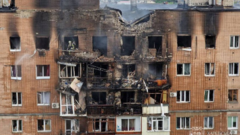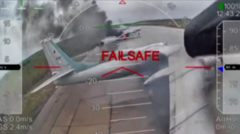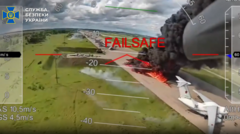As Ukraine moves towards potential peace talks, families of thousands of missing civilians worry their loved ones may be neglected in the process, fearing the lasting impact of captivity.
Families Fear Peace Talks Will Overlook Ukraine’s Missing Civilians

Families Fear Peace Talks Will Overlook Ukraine’s Missing Civilians
Concern grows among families of captured Ukraine civilians as peace discussions advance.
In Bucha, Ukraine, families anguished over missing loved ones grapple with the chilling prospect that peace negotiations may overlook the fate of nearly 16,000 Ukrainian civilians believed to be imprisoned in Russia. Among them is Tatyana Popovytch, whose son Vladislav, taken captive at a check-point three years ago, remains a source of deep worry for her. She recalls the moment she found hope through Serhii, a former prisoner who heard her son's voice while detained, yet this small flicker of encouragement has dwindled amid ongoing uncertainty and inadequate communication from the authorities.
Families are increasingly disheartened as officials indicate that there is no formal framework for returning civilians, as the Geneva Convention primarily addresses prisoners of war. Yulia Hripun, whose father was abducted, shares her frustration at official meetings, lamenting the lack of focus on civilian repatriation amongst high-level discussions. Meanwhile, Ukrainian human rights leaders express their concerns over the absence of a concrete strategy to facilitate the civilians’ return amid rising fears that the ongoing conflict will result in their complete erasure from the dialogue.
With recent exchanges yielding only a small number of civilian detainees, parents like Petro Sereda live in a state of limbo, hoping for news while bracing for the emotional toll of Russian captivity. For Tatyana, the thought of her son returning invokes a complex mix of longing and trepidation as she reflects on what he may endure. The trauma of separation weighs heavily on each family, leading them to confront not only the potential impact of captivity on their loved ones but also the heart-wrenching losses experienced during their absence. As peace talks loom, they are left to hope and prepare for a future reunion fraught with uncertainty.
Families are increasingly disheartened as officials indicate that there is no formal framework for returning civilians, as the Geneva Convention primarily addresses prisoners of war. Yulia Hripun, whose father was abducted, shares her frustration at official meetings, lamenting the lack of focus on civilian repatriation amongst high-level discussions. Meanwhile, Ukrainian human rights leaders express their concerns over the absence of a concrete strategy to facilitate the civilians’ return amid rising fears that the ongoing conflict will result in their complete erasure from the dialogue.
With recent exchanges yielding only a small number of civilian detainees, parents like Petro Sereda live in a state of limbo, hoping for news while bracing for the emotional toll of Russian captivity. For Tatyana, the thought of her son returning invokes a complex mix of longing and trepidation as she reflects on what he may endure. The trauma of separation weighs heavily on each family, leading them to confront not only the potential impact of captivity on their loved ones but also the heart-wrenching losses experienced during their absence. As peace talks loom, they are left to hope and prepare for a future reunion fraught with uncertainty.





















